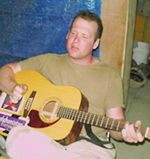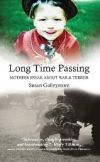
Publisher:
Bonnie King
CONTACT:
Newsroom@Salem-news.com
Advertising:
Adsales@Salem-news.com

~Truth~
~Justice~
~Peace~
TJP
Feb-21-2011 00:05


 TweetFollow @OregonNews
TweetFollow @OregonNews
A Veteran in America: Trying to Find the Way Home
Susan Galleymore Special to Salem-News.comDespite centuries of war, there is no successful strategy that helps veterans re-integrate into a comfortably ignorant, binary world.
 Author and anti-war activist Susan Galleymore on Democracy Now's War and Peace Report with Amy Goodman. Iraq photos below by Tim King Salem-News.com |
(ALAMEDA, Calif.) - Jason Moon's mother tells him that as a young child he loved writing songs and that during long car trips he'd share his songs with her. Today, he's writing songs again. But for more than five years following his return from a year-long tour of duty in Iraq, he could barely write a line.
 Jason Moon |
Moon deployed to Talil Airbase with the Wisconsin National Guard in 2003. In March 2008 he was ready to testify at the four-day long Winter Soldier hearings held in in Silver Spring, Maryland. His would be one of more than 200 eyewitness accounts of injustices perpetrated by US forces in Iraq and Afghanistan. He planned to tell of direct orders to “run over any children that got in the way of military vehicles.”
Moon's three-year-old son looked like the Iraqi children and the order was as shocking to Moon then as it would be the Americans who heard it later.
“People accused me of lying...or said our unit was a bad apple.”
Nowadays there are countless assertions of this order being carried out.
“Recently I heard that our unit was even involved in one such event and that the Civil Affairs unit went to the parents of the girl who'd been killed and, at gun-point, forced them to sign off on accepting $200 for her death.” Moon broke down the day before he was to present his testimony. Instead of attending the hearing, he checked himself into a hospital where he shuffled around “without shoelaces in my shoes.”
This suicide watch was the beginning of a long – and continuing – journey searching for a life Moon feels is worth living.
“My question is: how do they [the military and the population it serves] expect people to be in an environment where violence and killing is encouraged, accepted, and often rewarded then, when we come home and respond with the same mentality, we're put in prison. The juxtaposition of these two worlds as a soldier tries to readjust and tries to deal with the results of what he or she was asked to do” – that which was okay there and then and is not okay here and now – “can make a veteran feel crazy.”
Deployed troops long to return home. Yet, “When we come back it is not so wonderful after all. Since such a small percentage of our population understands – or wants to understand – the real issues [associated with war] troops and veterans must deal with it alone.”
The isolation only increases as civil society pays attention, not to the ongoing wars and the plight of the troops who fight them but to the latest news crisis, the economy, political corruption, unemployment, bankrupt state and city budgets, turmoil in Egypt spreading to other countries....
All the while US troops continue to deploy – some have served as many as six deployments – and veterans continue to confront their demons long after their military service ends.
What makes Moon's story especially poignant is his relationship to his son. The growing boy saw his father as a hero with whom he wanted to play the game of “good guys versus bad guys”.
It was excruciating. The boy was too young for lectures about the gritty realities of war. His father told him, gently, that even the 'bad guys' have mothers, are sons like he is, and that “people don't come back to life after they're killed.”
But Moon's body had its own way of surviving the pressure: it shut down. “When my son wanted to play war I became as tired as if I'd been drugged and I'd fall asleep.” Later, when they played together, “I'd find myself telling my 7-year-old how to flank a fighting position, or how to do covering fire, or correcting his battle strategies!”

There is a parallel in Jason Moon's experiences as a father and as a veteran. For explaining war to a child is like explaining the deep effects of war to an adult who has never experienced war. Neither has the capacity to understand how troops are trained to kill. Neither imagines the horrors combat troops see every day. Neither grasps how war affects human beings. Neither really wants to understand.
Only those who know war know the pleasure – and the pain – of returning home where the vast majority of fellow citizens care nothing for one's extraordinary experiences. Despite centuries of war, there is no successful strategy that helps veterans re-integrate into a comfortably ignorant, binary world.
 |
(Published in War Times)

 |
Susan Galleymore is author of Long Time Passing: Mothers Speak about War and Terror, (which can be ordered from Amazon.com by clicking the book photo on the left), host and producer of Raising Sand Radio, and a former “military mom” and GI Rights counselor.
Contact her at susan@raisingsandradio.org.
Articles for February 20, 2011 | Articles for February 21, 2011 | Articles for February 22, 2011




Quick Links
DINING
Willamette UniversityGoudy Commons Cafe
Dine on the Queen
Willamette Queen Sternwheeler
MUST SEE SALEM
Oregon Capitol ToursCapitol History Gateway
Willamette River Ride
Willamette Queen Sternwheeler
Historic Home Tours:
Deepwood Museum
The Bush House
Gaiety Hollow Garden
AUCTIONS - APPRAISALS
Auction Masters & AppraisalsCONSTRUCTION SERVICES
Roofing and ContractingSheridan, Ore.
ONLINE SHOPPING
Special Occasion DressesAdvertise with Salem-News
Contact:AdSales@Salem-News.com
Terms of Service | Privacy Policy
All comments and messages are approved by people and self promotional links or unacceptable comments are denied.
i serrved in the 70 February 21, 2011 4:40 pm (Pacific time)
and the vc used kid's to kill gi and set trapes and to carry suplies and even to teach them to kill us so i understand it is hard to understand but in some casses a kid is the one's to fear most as they have no fear of you now that is not to say what happend should have happend but i would like to know why that order was given and then make a judgment as a vet i do not think killing anyone with out reason is good but first we need to know the why of it .
Amanda February 21, 2011 4:03 pm (Pacific time)
Having been an army wife years ago, I still feel connected to the military, and am fully aware, of the disregard most soldiers encounter, once they are discharged - and do not have a family to return to, and help them integrate into civilian life. Most people do not realize, that military life, especially in war zones, is a family of its own.Separation from that military family, can be devastating to a young man or woman. It should be the "Services" responsibility to have special programs to help our man and women back to civilian life.
[Return to Top]©2026 Salem-News.com. All opinions expressed in this article are those of the author and do not necessarily reflect those of Salem-News.com.